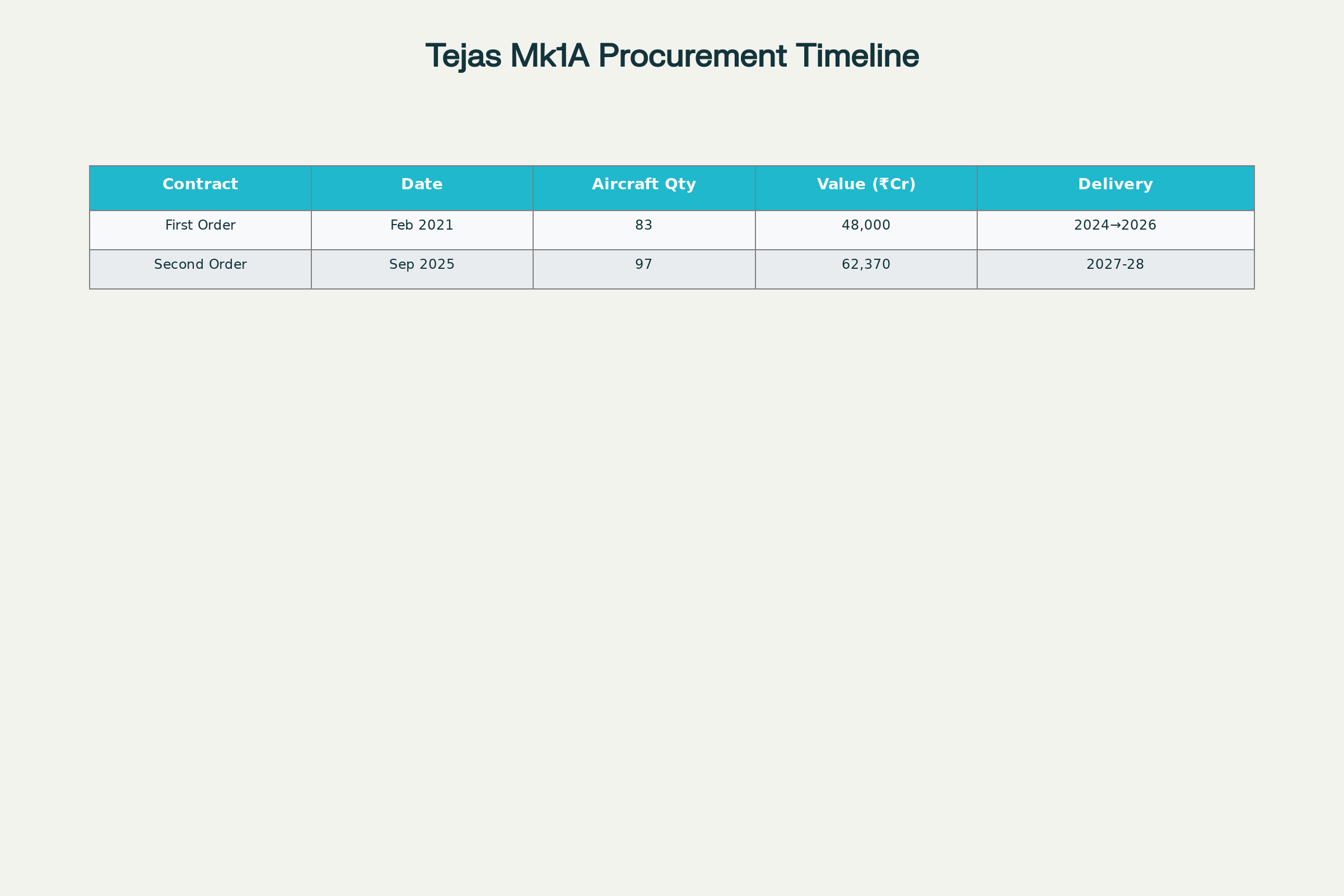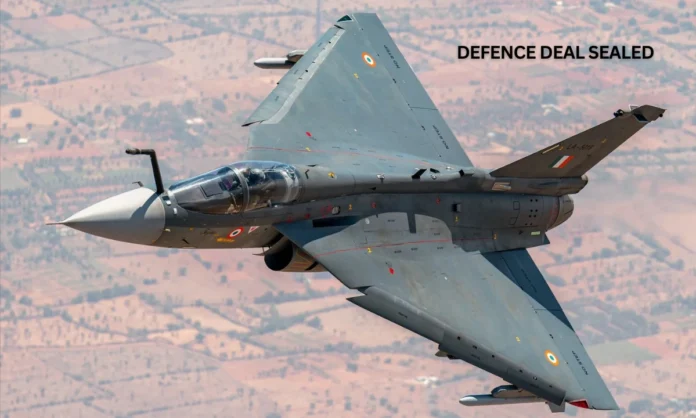Key Highlights
- Defence Ministry finalizes Rs 62,370 crore contract with HAL for 97 Tejas Mk1A aircraft, comprising 68 fighters and 29 twin-seat trainers
- Indigenous content reaches over 64% with 67 additional items incorporated compared to previous contract, featuring advanced systems like Uttam AESA radar
- Delivery timeline spans six years starting 2027-28, generating approximately 11,750 direct and indirect jobs annually through robust vendor network of 105 Indian companies
Critical Force Strengthening Initiative
The Defence Ministry‘s Rs 62,370 crore agreement with Hindustan Aeronautics Limited represents a pivotal moment for India’s aerospace capabilities amid pressing security challenges. This second major Tejas Mk1A procurement follows the February 2021 contract for 83 aircraft worth Rs 48,000 crore, bringing the total Tejas Mk1A commitment to 180 aircraft valued at over Rs 1.1 lakh crore. The timing proves crucial as the Indian Air Force formally retires its last MiG-21 squadron, reducing operational fighter strength to just 29 squadrons against the sanctioned requirement of 42. The Tejas Mk1A procurement directly addresses this capability gap while advancing the government’s Atmanirbhar Bharat initiative through enhanced indigenous manufacturing.
The contract encompasses 68 single-seat fighters and 29 twin-seat trainer variants, each incorporating significant technological advances over previous models. Advanced systems include the indigenously developed Uttam Active Electronically Scanned Array radar, Swayam Raksha Kavach electronic warfare suite, and upgraded control surface actuators. Production involves a comprehensive network of 105 Indian suppliers, demonstrating the program’s substantial contribution to domestic industrial capacity. Manufacturing operations will utilize HAL’s expanded facilities in Bengaluru and Nashik, with production capacity scaling from 18 to 28 aircraft annually to meet delivery commitments.
Advanced Indigenous Technology Integration
The Tejas Mk1A represents India’s most sophisticated indigenous fighter platform, featuring over 40 improvements compared to the original Tejas Mark 1 configuration. Indigenous content exceeds 64%, incorporating 67 additional domestically produced components not present in the earlier 2021 contract. The aircraft integrates cutting-edge avionics centered around dual radar systems including the Israeli EL/M-2052 AESA radar and the indigenously developed Uttam AESA radar. Electronic warfare capabilities receive substantial enhancement through the Unified Electronic Warfare Suite and Advanced Self-Protection Jammer pods, significantly improving survivability in contested environments.
Weapons integration capabilities encompass nine hardpoints supporting Beyond Visual Range missiles, Advanced Short Range Air-to-Air Missiles, and comprehensive air-to-ground munitions. The platform features in-flight refueling capability, Onboard Oxygen Generation System for extended endurance, and upgraded cockpit systems including Combined Interrogator and Transponder with digital map generation. Manufacturing specifications demonstrate remarkable advancement with reduced turnaround times and improved maintainability compared to predecessor aircraft. The F404-IN20 engine by GE Aerospace provides proven performance, having enabled Tejas to achieve Mach 1.1 during initial test flights while featuring high-flow fans and single-crystal turbine blades.
Strategic Fleet Modernization Context
India’s fighter aircraft modernization occurs against a backdrop of severe squadron shortfalls that have reached six-decade lows. Current operational strength stands at 29 squadrons following MiG-21 retirement, representing approximately 70% of the authorized 42-squadron requirement. Defense analysts project the need for substantial force expansion, with internal assessments suggesting requirements could reach 54-56 squadrons to address two-front war scenarios. The shortfall becomes more pronounced considering regional security dynamics, as Pakistan maintains 25 fighter squadrons while China continues expanding its air capabilities.
The Tejas Mk1A program directly supports fleet regeneration through proven indigenous technology, reducing dependence on foreign suppliers while building domestic aerospace expertise. HAL’s production timeline faces initial challenges due to GE engine supply constraints, with only three F404 engines delivered against orders for 99 units. However, GE has committed to delivering 12 engines in 2025 and 20 engines in fiscal year 2026, enabling initial aircraft deliveries. The strategic importance extends beyond immediate capability gaps, as Tejas platforms will form the foundation for future variants including the Tejas Mk2 and Advanced Medium Combat Aircraft programs.

Timeline of Tejas Mk1A Fighter Jet Procurement Contracts
Economic Impact and Industrial Development
The Tejas Mk1A procurement generates substantial economic benefits through comprehensive industrial participation and employment creation. Annual job generation reaches approximately 11,750 direct and indirect positions throughout the six-year production cycle, supporting India’s manufacturing sector growth. The program leverages a robust vendor base of 105 Indian companies directly engaged in component manufacturing, creating extensive supply chain networks across multiple states. Capital allocation under the Defence Budget 2025-26 provides Rs 48,614 crore specifically for aircraft and aero-engines, demonstrating government commitment to aviation sector development.
Manufacturing operations span multiple facilities with HAL establishing additional production lines in Nashik to complement existing Bengaluru capacity. The indigenous content requirement of over 64% ensures technology transfer and skill development within domestic industry. Component manufacturing encompasses advanced systems including AESA radars, electronic warfare suites, flight control computers, and weapons integration systems. Export potential represents additional economic opportunity, with countries including Egypt, Argentina, Malaysia, Indonesia, and the Philippines expressing interest in Tejas procurement.
Final Assessment
The Rs 62,370 crore Tejas Mk1A contract marks a defining moment in India’s defense manufacturing evolution, combining immediate operational requirements with long-term strategic autonomy objectives. This procurement directly addresses critical capability gaps while establishing foundations for sustained indigenous aerospace development. The program’s success will determine India’s ability to achieve fighter squadron strength targets and reduce foreign dependency in critical defense technologies. As delivery commences in 2027-28, the Tejas Mk1A will serve as the cornerstone of India’s multi-role fighter fleet, replacing aging MiG-21 platforms while providing advanced multi-mission capabilities. The comprehensive industrial participation and job creation demonstrate defense procurement’s broader economic impact, supporting the government’s vision of transforming India into a global aerospace manufacturing hub.


